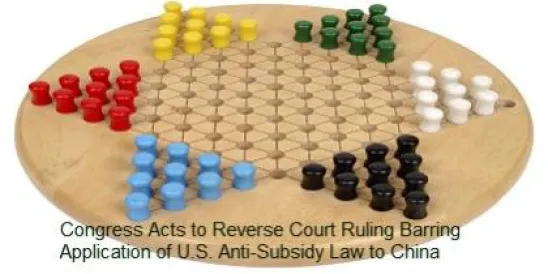The U.S. Congress has approved with startling speed legislation intended to reverse a court ruling that, if upheld, would prohibit U.S. companies from pursuing trade remedies against Chinese manufacturers or exporters receiving government subsidies. The constitutionality of the legislation’s retroactive application, however, is sure to be challenged in the courts.
The U.S. Congress has approved legislation that would affirm the authority of the U.S. Department of Commerce (DOC) to impose countervailing duties on imports from China and other non-market economies (NMEs) in trade remedy cases. The legislation, which President Obama has indicated he will sign, is intended to reverse a December 19, 2011, decision of the U.S. Court of Appeals for the Federal Circuit (CAFC), GPX International Tire Corp. v. United States, 2011-1107-09, in which it ruled that the DOC may not apply countervailing duty (CVD) law to NME countries.
The Obama administration is simultaneously challenging the GPX decision in the courts. On March 5, 2012, the U.S. Department of Justice filed a petition asking all nine judges of the CAFC to re-hear en banc the original decision by the three-judge panel in GPX. If the CAFC denies the re-hearing request, the administration will have 90 days from the denial to decide whether to appeal to the Supreme Court of the United States.
For many years, the DOC refused to apply CVD law to NME countries, maintaining that subsidies, which are devices “used by governments to distort the signals that the market gives to firms,” by definition do not exist in economies that are not controlled by market forces. In a 1986 case, Georgetown Steel Corp. v. United States, 801 F.2d 1308 (Fed. Cir. 1986), the CAFC sustained the DOC’s approach. Under pressure from various U.S. industries, however, the agency reversed its position in 2007, and since that time has applied both antidumping and CVD duties in numerous cases involving China.
In GPX, invoking the principle of “legislative ratification,” the CAFC concluded the DOC is barred by statute from applying the CVD law to NME goods, holding that Congress ratified DOC’s earlier interpretation by amending and reenacting the CVD statute in 1988 and 1994, “thereby requiring that we construe the statute as barring countervailing duties in the NME context.” The new legislation addresses this issue very simply, providing that the merchandise on which CVD duties shall be imposed under the statute includes merchandise from an NME country, unless the DOC “is unable to identify and measure subsidies provided by the government of the [NME] country or a public entity within the territory of the [NME] country because the economy of that country is essentially comprised of a single entity.”
In addition to reversing the GPX decision, the new legislation seeks to address the issue of the concurrent application of antidumping and countervailing duties, the so-called “double counting” problem that caused the Appellate Body of the World Trade Organization (WTO)—and the U.S. Court of International Trade, in a decision that was affirmed by the CAFC on other grounds—to reject the DOC’s application of CVD law to NMEs. The double counting issue arises from the interplay between the CVD law and the NME antidumping methodology employed by the DOC. To address the issue, the bill provides for the DOC to make a reduction to antidumping duties in NME cases where CVD duties are also being imposed if the respondent can show that subsidies have inflated the dumping margin, and if DOC is able to reasonably estimate an adjustment. These are big ifs, and it is unclear whether the agency will ever be able to make an adjustment in an actual case.
The most controversial aspect of the legislation is likely to be the effective date of its reversal of the GPX decision, which applies retroactively to all proceedings initiated on or after November 20, 2006, as well as all resulting actions by U.S. Customs and Border Protection and all related court actions. The purpose of this retroactive effective date is to maintain the two dozen CVD orders that the DOC has promulgated in the last several years, all of which would be void unless GPX is overturned either legislatively or on appeal (by the CAFC en banc or the Supreme Court). Whether the legislation’s retroactive application is constitutional, however, is an issue sure to be tested in the courts in the months ahead.





 />i
/>i

